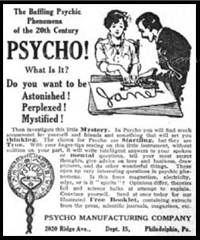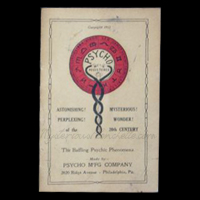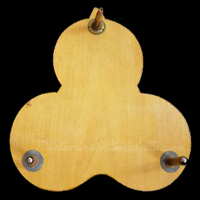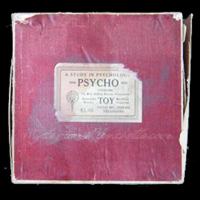While we have lots of materials produced by the Psycho Manufacturing Company, we know very little about them. Without any other known games, toys, or items under the moniker, we can assume that the company formed with the sole purpose of producing their namesake product-the Psycho planchette. In the spirit of their and Kirby & Co forebears, Psycho produced an 8-page brochure that was included with each board, but also available free on request from the company, who no doubt mailed many in the wake of their 1914 Life Magazine advertisement.
The brochure claims to be the collected opinions of "many disinterested investigators" on the Psycho board, when in fact it is merely selected reprints of much earlier news articles on planchettes-most of which date to the 1868 craze-that simply exchanged the word "Psycho" in for "Planchette" where appropriate, giving the illusion that psychic authorities have given their highest blessings to the company's product. Curiously, the praise also includes the hilarious breakdown of "battery matches" between couples: two females are better than two males, husband and wife don't work well together, a man and someone else's wife do, etc--that appears in Kirby & Co's literature and on the yellow paper label of the "Kirby Clone" of unknown manufacture.
The boards themselves are beautiful and innovative. Indeed, they seem more modern than they actually are. The planks are of high-quality blonde maple, with smooth but unbeveled edges, and a nicely sanded bottom. The shape is a distinctive "3-ball" design of interlocking spheres, and the top sports a nice horoscope ring illustration in red and black ink. A pair of intertwined snakes below the item's arched logo represent a sort of wingless caduceus, which may represent Hermes, of course fitting since he was the messenger of the gods. A brass sleeve insert serves as the pencil aperture, and the castors have a surprisingly modern ball-bearing design that hearkens back to the Weyers Bros and Two Worlds castor design, but also looks ahead to Venture Bookshop models of the 1960s. Like these later planks, the castors are slim, and of a fixed diameter matching their enclosed ball-bearings along their entire length. They penetrate through the plank's top, where a single screw and washer hold them to the board.
The box is that favored color of planchette boxes-deep burgundy-and has a simple label on the topside promising the contents are Remarkable! Amusing! Mystifying! and Perplexing! It also declares in bold, much bigger font, the word "TOY," taking a bit of the edge off the "baffling psychic phenomena" and "study in psychology" claims of the enclosed brochure. The box's inner label reprints much of the brochure's instruction literature. Overall, the Psycho is a wonderful planchette, and one can only wonder if the company's timing when introducing the product had been more fortuitous, if the planchette would have been more popular than it proved to be. But this modern scarcity drives its value as a collectible, and lucky are those to have one in their collections!










